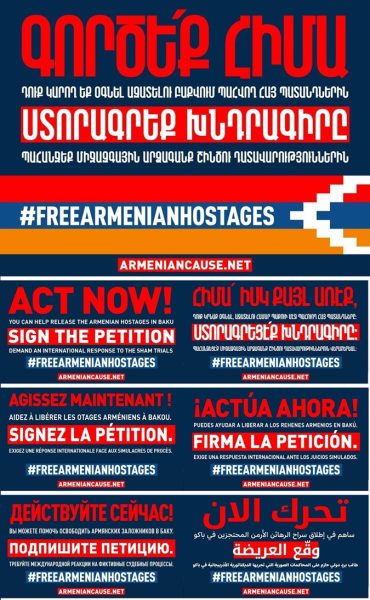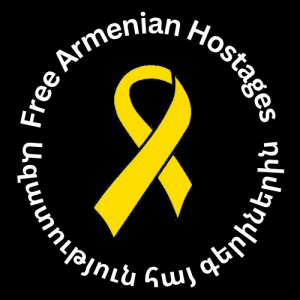Հայ գերիների պաշտպանության համար խնդրագրի մեկնարկ
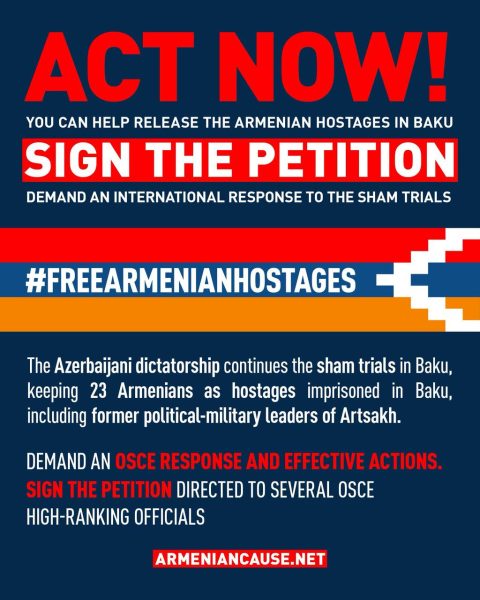
You can help release the Armenian hostages in Baku.
Demand an international response to the sham trials
The Azerbaijani dictatorship continues the sham trials in Baku, keeping 23 Armenians as hostages imprisoned in Baku, including former political-military leaders of Artsakh.
Demand an OSCE response and effective actions.
Sign the petition addressed to several OSCE high-ranking officials.
#FreeArmenianHostages
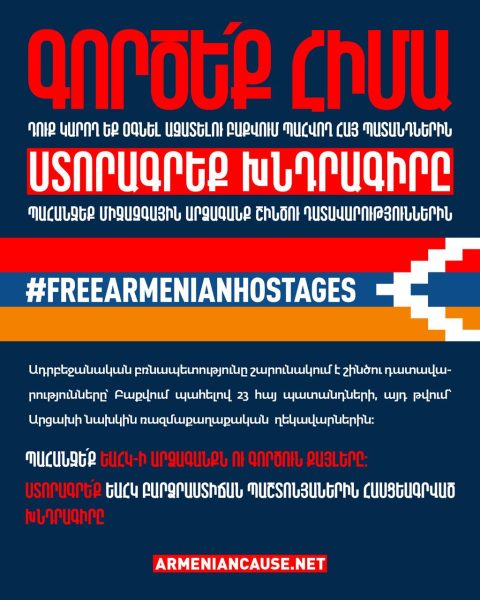
Դուք կարող եք օգնել ազատելու Բաքվում պահվող հայ պատանդներին։
Պահանջեք միջազգային արձագանք շինծու դատավարություններին։
Ադրբեջանական բռնապետությունը շարունակում է շինծու դատավարությունները՝ Բաքվում պահելով 23 հայ պատանդների, այդ թվում՝ Արցախի նախկին ռազմաքաղաքական ղեկավարներին։
Պահանջեք ԵԱՀԿ-ի արձագանքն ու գործուն քայլերը։
Ստորագրե՛ք ԵԱՀԿ բարձրաստիճան պաշտոնյաներին հասցեագրված խնդրագիրը։
#FreeArmenianHostages
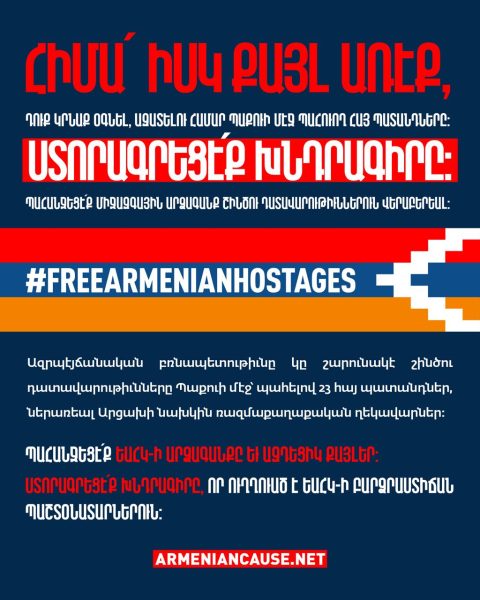
Դուք կրնաք օգնել, ազատելու համար Պաքուի մէջ պահուող հայ պատանդները։
Պահանջեցէ՛ք միջազգային արձագանք շինծու դատավարութիւններուն վերաբերեալ։
Ազրպէյճանական բռնապետութիւնը կը շարունակէ շինծու դատավարութիւնները Պաքուի մէջ՝ պահելով 23 հայ պատանդներ, ներառեալ Արցախի նախկին ռազմաքաղաքական ղեկավարներ։
Պահանջեցէ՛ք ԵԱՀԿ-ի արձագանքը եւ ազդեցիկ քայլեր։
Ստորագրեցէ՛ք խնդրագիրը, որ ուղղուած է ԵԱՀԿ-ի բարձրաստիճան պաշտօնատարներուն։
#FreeArmenianHostages
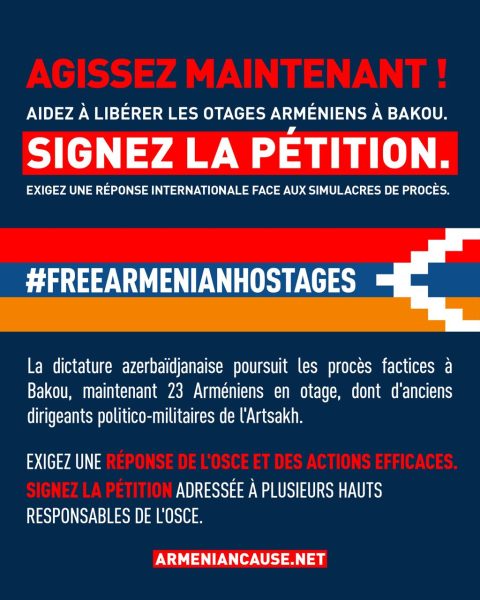
Aider à libérer les otages arméniens à Bakou.
Exigez une réponse internationale face aux simulacres de procès.
La dictature azerbaïdjanaise poursuit les procès factices à Bakou, maintenant 23 Arméniens en otage, dont d’anciens dirigeants politico-militaires de l’Artsakh.
Exigez une réponse de l’OSCE et des actions efficaces.
Signez la pétition adressée à plusieurs hauts responsables de l’OSCE.
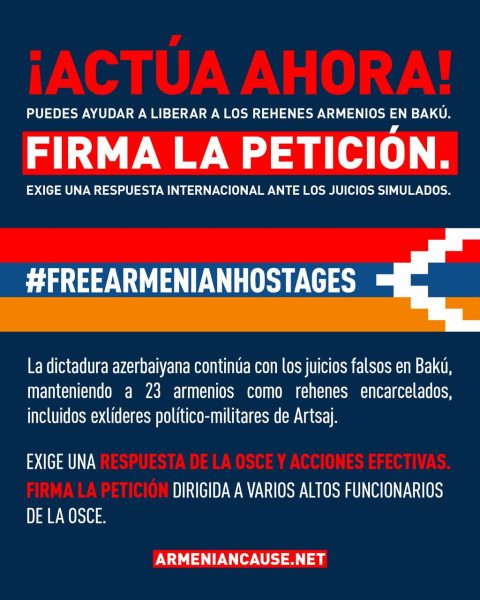
Puedes ayudar a liberar a los rehenes armenios en Bakú.
Exige una respuesta internacional ante los juicios simulados.
La dictadura azerbaiyana continúa con los juicios falsos en Bakú, manteniendo a 23 armenios como rehenes encarcelados, incluidos exlíderes político-militares de Artsaj.
Exige una respuesta de la OSCE y acciones efectivas.
Firma la petición dirigida a varios altos funcionarios de la OSCE.
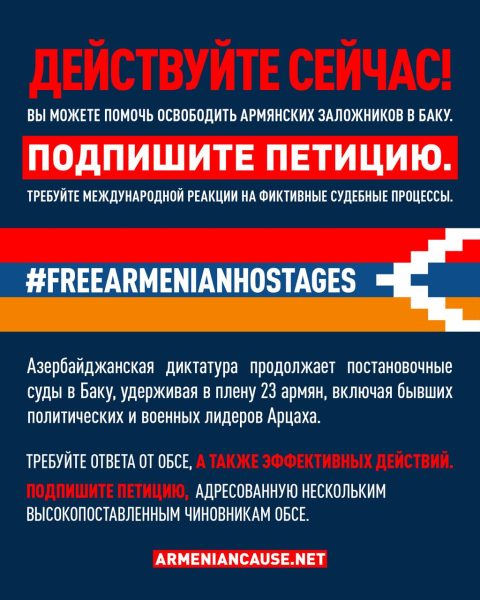
Вы можете помочь освободить армянских заложников в Баку.
Требуйте международной реакции на фиктивные судебные процессы.
Азербайджанская диктатура продолжает постановочные суды в Баку, удерживая в плену 23 армян, включая бывших политических и военных лидеров Арцаха.
Требуйте ответа от ОБСЕ, а также эффективных действий.
Подпишите петицию, адресованную нескольким высокопоставленным чиновникам ОБСЕ.

ساهم في إطلاق سراح الرهائن الأرمن المحتجزين في باكو.
طالب بردٍ دولي حازم على المحاكمات الصورية التي تجريها الديكتاتورية الأذربيجانية في باكو.
23 أرمنيًا محتجزون ظلماً، بينهم قادة سياسيون وعسكريون سابقون في أرتساخ ، يُستخدمون كورقة ضغط.
آن الأوان لمحاسبة أذربيجان على انتهاكاتها الجسيمة لحقوق الإنسان.
طالب باستجابة فعالة من منظمة الأمن والتعاون في أوروبا (OSCE) واتخاذ إجراءات حاسمة.
وقّع العريضةالموجهة إلى كبار مسؤولي المنظمة وكن جزءًا من التغيير.
معًا يمكننا تحقيق العدالة!

